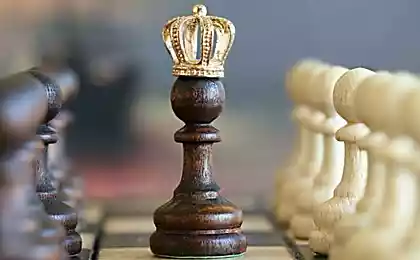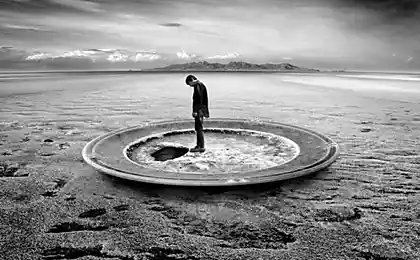501
What is my strength and my weakness
The humiliation included in the category of experiences, which we try to avoid. This is quite understandable. To be humiliated or doing something humiliating means to come into contact with something that drops our human dignity reduces self-esteem and, in extreme cases, throwing the man to the social bottom.
No wonder a different kind of despotic kings/rulers/Director, kept in power by suppressing dissent, often try not just to "disarm" their victims, but also humiliate them — both in their own eyes and in the eyes of others.
Eighty seven million two hundred seventy nine thousand two hundred four
In the criminal environment extreme humiliation — to be "lowered" below the status in the hierarchy of prisons, no. The purpose of the insults, which often throws people in real and virtual life is to humiliate, that is, to show that the person I insult is worse below me.
And on the other the humiliation of the pole is arrogance — also rejected by many people experience and related behavior. In General, a very unpleasant series is built around humiliation, insult, scorn, rejection, disgust, arrogance…
And therefore, quite strange will probably be the assertion that the experience of humiliation is often an integral part of authentic human development without which progress is often extremely problematic. Of course, I do not propose to humiliate people, but I want to think about it my approval.
What is the essence of humiliation, actions and experiences are closely associated with a sense of shame? I think best expresses the following sentence, addressed to himself: "I'm not as good as I believed and felt" (and if someone humiliates us, he tells us: "you're not as good as you think you are" — and we believe).
Not "as good" in General or in some particular spheres of life. We all have some image of themselves. Is the "I-ideal" to aim for, which can be felt as a hard act to follow — or as a simple reference point in my life, with whom we synchronize our actions and decisions.
There's "I'm real" — what we are "really". "Actually" is not in objective reality, of course, but what we feel now. Most of us, consciously or unconsciously, feels as though relatively, but still good people.
This "overall I'm good" — based self-esteem, the ability to see your worth, self-respect. A bit old-fashioned — but this does not become less relevant — the word "honor" is also based on the perception of themselves as "generally good".
The basis of honor is, as I understand it, matching personal skills and human behavior pattern that is passed to them or society for a decent. It is right to evaluate themselves and their existence in the category of self-esteem. Honor defines a person with valid and invalid words, and actions, and making the last drops of man in his own eyes.
On the experience "I present." was founded, and our many excuses when we commit any acts or with us doing something that clearly violates what we believe is acceptable. For example, forced to lie where we don't want to lie, or under the threat of dismissal to do that for us "like" neprimemlemo... where self-justification, the soothing of the conscience, often work in the displacement, splitting, and many other defense mechanisms that protect us from unbearable shame.
It is important to distinguish between humiliation as a deliberate action against another person and humiliation as an act performed within ourselves (I mostly write here about the internal action). For example, play two hockey teams, and one ruthlessly defeated another. She humiliated opponents by the fact of an overwhelming victory? No, but the loser can feel humiliated: "we felt that we were worthy to fight them, but they pointed us in our place...". And the winners can Express compassion to the vanquished, and unable to offend. The very fact of their victory, humiliation is not.
So, humiliation is not just the discovery that your actions (thoughts, feelings, qualities, skills, abilities,...) in total contradiction of the image of the "good of the present self" and the destruction of the "I" (or, more often — part). This experience of falling from the pedestal on which he and offered. Humiliation often arises during the study and in the professional field.
For example, do you consider yourself an professional in the business — and then you are sent to study at any center, only to discover, first, professionals have so much more, and a lot of them, and they are not unique. And realize that what you were proud of and believed that the pinnacle of his skill is only the first step, basic level. And worst of all — around, too, noticed that you... well... not really compared to them. No, they aren't bullied, don't laugh — but I saw... And how would you respond?
Or, for example, I consider myself a smart and critically-minded person — and then suddenly find that an important issue for me I'm not just wrong, but made some frankly stupid assumptions or errors that are typical for those whom I considered "worse". How will I react? Just say "Yes, I was wrong, and here made a mistake..."— or start by trying to evade the humiliation, to find an excuse for yourself and try to jump back on the podium "is always smart and critical person," from which you just flew?
Humiliation badly and the whole nation. Defeated in wars and confrontations are hardly recognized "it seems that we are not so good, once I lost" — they often start to talk about "the fifth column", traitors, treachery, enemies and so on. National humiliation of the Germans in the First world nurtured the Nazis, who invited the Germans to go to the other extreme — racist arrogance: "you are worse than us." Can hardly survive humiliation after the collapse of the Soviet Union and post-Soviet countries, and this concerns not only Russia.
For the experience of humiliation requires not only an inner feeling that "I'm not as good as believed". Feel below can only be compared to someone. For example, I imagine that you're better than other people at something, and then something happens and you realize that the same or even worse. That they lie just as "they"; that drink vodka in the same amount and with the same consequences as the "last drunk".
Additional shades of humiliation adds to the frustration of others in us. "We thought you are, and you...". In experience join touch of guilt: "you depended on me, and I... failed, deceived."
But the disappointment of other people in us becomes almost unbearable, when we ourselves were fascinated. In General, this is the source of our humiliation, in my opinion — a fascination, when instead of pumpkin (maybe even very good) see the carriage. And the disappointment in yourself is a necessary stage in order to return to reality.
Back in the real world where you're not standing on shaky ground, and lean on the broad earth is one of the possible consequences of humiliation. The higher the pedestal, the stronger the fascination a — the harder they fall and the unsightly picture, when with eye drops the veil.
According to one alcoholic, he realized the depth of his degradation when he saw in the eyes of his school friend, who had not seen for many years, disgust. And then the sad Prince-philosopher, experiencing the imperfection of this world, turned into foul-smelling alkoholika, prop all the furniture, lost his wife and job. The real sobering.
However, moments of sobriety can be very brief. Often people rush into one of the extremes.
1) to Return the charm. For this there are a wide range of protections aimed at the implementation of the slogan "I'm a Prince, I just took mud and smeared". It's not that we lost, betrayed us. It's not I'm incompetent in certain issues, this kicker is jealous of me. I'm a therapist/coach/teacher — universal, and that with some customers you can't work — so that customers/students unprepared, incompetent and without motivation.
In hockey we did not lose because degraded under the guidance of our hockey, but because those players have taken, that if instead of Baranova and More would take Kozlov and Gigantov — that would be the case!.
You can declare an environment where we are constantly faced with internal humiliation, "uncomfortable, not suitable for me" and go back much easier. This, of course, is not about the environment where we really other people trying to humiliate and expose from such environments need to leave. But, by the way, to start strongly to humiliate others to fall into arrogance — this is also a way to re-fascinated. Arrogant man takes to himself a status above which no — status judges. "I'm better than you, don't come near me."
2) the Second extreme is to humiliate yourself even more. Arrogance, unleashed on the very same himself. A monument is a good spying on us, lying at its foot, and with an unpleasant grimace says: you failed, you're not me, get off my pedestal, not to soil his snot my pedestal!
The most striking examples of vacillation from arrogance to self-abasement I regularly see at our sporting fans, who in moments of victories shout this trite "we're the best!!! we all tear!!!"and in moments of defeat — "we days and and school, it's bad!". From session to session-aggrandizement of self-exposure and self-flagellation.
There is a third option, and it's not really about the "Golden mean". Falling and hitting hurts, you can get up and start to look around: where was I? Yes, I feel humiliation and it is very painful, won from hitting bruises ache or even fracture in the soul. But what is the height from which I fell? How did I get on this high a pedestal? What was charmed? And what now surrounds me?
Are there people I even in this state can come to for support? Who will not turn up his nose, "EW, what are you really", and will — and will not sing sweet songs that you're beautiful, and sympathetic look at the wounds and help them heal? Tell about your scars or even show — and share the experience? And will you be able to hear them, or want to run to the arrogant "I don't need your help!"?
And then — on training. Yes, we can try to humiliate completely uncalled for. The boss can be a tyrant. Can be humiliating to go to learn from those who have surpassed you, and who considered themselves equal (or even below). Humiliating to admit that they engaged in self-deception.
Humiliating to discover that you triumph passed and that the gold is already peeled, and withered laurels. All this is really painful, and you can try this pain to ease, to distract from it. And you can take the pain on the arms, listen to her, to dispel the fascination for them — and to use the energy that it gives to learn to do something in reality.
It will be interesting:
Letter of release: a method to understand the causes of the situationsThat will tell you about your OFFENSE. Or whom to forgive?
Even better, of course, fascinated, and knowing what my strength and what my weakness. But the ability after failing to get up, say to yourself "Yes, I was wrong here", and go to work on mistakes without self-abasement precisely to the weaknesses not the case.
Moreover, such a reaction people can see and appreciate, because, in my opinion, one of the highest manifestations of human dignity.
And the one who sees and tries to hit the fallen, himself, is not likely to cope with his fear of humiliation. published
Author: Ilya Latypov
Source: tumbalele.livejournal.com/111136.html?utm_source=fbsharing&utm_medium=social
No wonder a different kind of despotic kings/rulers/Director, kept in power by suppressing dissent, often try not just to "disarm" their victims, but also humiliate them — both in their own eyes and in the eyes of others.
Eighty seven million two hundred seventy nine thousand two hundred four
In the criminal environment extreme humiliation — to be "lowered" below the status in the hierarchy of prisons, no. The purpose of the insults, which often throws people in real and virtual life is to humiliate, that is, to show that the person I insult is worse below me.
And on the other the humiliation of the pole is arrogance — also rejected by many people experience and related behavior. In General, a very unpleasant series is built around humiliation, insult, scorn, rejection, disgust, arrogance…
And therefore, quite strange will probably be the assertion that the experience of humiliation is often an integral part of authentic human development without which progress is often extremely problematic. Of course, I do not propose to humiliate people, but I want to think about it my approval.
What is the essence of humiliation, actions and experiences are closely associated with a sense of shame? I think best expresses the following sentence, addressed to himself: "I'm not as good as I believed and felt" (and if someone humiliates us, he tells us: "you're not as good as you think you are" — and we believe).
Not "as good" in General or in some particular spheres of life. We all have some image of themselves. Is the "I-ideal" to aim for, which can be felt as a hard act to follow — or as a simple reference point in my life, with whom we synchronize our actions and decisions.
There's "I'm real" — what we are "really". "Actually" is not in objective reality, of course, but what we feel now. Most of us, consciously or unconsciously, feels as though relatively, but still good people.
This "overall I'm good" — based self-esteem, the ability to see your worth, self-respect. A bit old-fashioned — but this does not become less relevant — the word "honor" is also based on the perception of themselves as "generally good".
The basis of honor is, as I understand it, matching personal skills and human behavior pattern that is passed to them or society for a decent. It is right to evaluate themselves and their existence in the category of self-esteem. Honor defines a person with valid and invalid words, and actions, and making the last drops of man in his own eyes.
On the experience "I present." was founded, and our many excuses when we commit any acts or with us doing something that clearly violates what we believe is acceptable. For example, forced to lie where we don't want to lie, or under the threat of dismissal to do that for us "like" neprimemlemo... where self-justification, the soothing of the conscience, often work in the displacement, splitting, and many other defense mechanisms that protect us from unbearable shame.
It is important to distinguish between humiliation as a deliberate action against another person and humiliation as an act performed within ourselves (I mostly write here about the internal action). For example, play two hockey teams, and one ruthlessly defeated another. She humiliated opponents by the fact of an overwhelming victory? No, but the loser can feel humiliated: "we felt that we were worthy to fight them, but they pointed us in our place...". And the winners can Express compassion to the vanquished, and unable to offend. The very fact of their victory, humiliation is not.
So, humiliation is not just the discovery that your actions (thoughts, feelings, qualities, skills, abilities,...) in total contradiction of the image of the "good of the present self" and the destruction of the "I" (or, more often — part). This experience of falling from the pedestal on which he and offered. Humiliation often arises during the study and in the professional field.
For example, do you consider yourself an professional in the business — and then you are sent to study at any center, only to discover, first, professionals have so much more, and a lot of them, and they are not unique. And realize that what you were proud of and believed that the pinnacle of his skill is only the first step, basic level. And worst of all — around, too, noticed that you... well... not really compared to them. No, they aren't bullied, don't laugh — but I saw... And how would you respond?
Or, for example, I consider myself a smart and critically-minded person — and then suddenly find that an important issue for me I'm not just wrong, but made some frankly stupid assumptions or errors that are typical for those whom I considered "worse". How will I react? Just say "Yes, I was wrong, and here made a mistake..."— or start by trying to evade the humiliation, to find an excuse for yourself and try to jump back on the podium "is always smart and critical person," from which you just flew?
Humiliation badly and the whole nation. Defeated in wars and confrontations are hardly recognized "it seems that we are not so good, once I lost" — they often start to talk about "the fifth column", traitors, treachery, enemies and so on. National humiliation of the Germans in the First world nurtured the Nazis, who invited the Germans to go to the other extreme — racist arrogance: "you are worse than us." Can hardly survive humiliation after the collapse of the Soviet Union and post-Soviet countries, and this concerns not only Russia.
For the experience of humiliation requires not only an inner feeling that "I'm not as good as believed". Feel below can only be compared to someone. For example, I imagine that you're better than other people at something, and then something happens and you realize that the same or even worse. That they lie just as "they"; that drink vodka in the same amount and with the same consequences as the "last drunk".
Additional shades of humiliation adds to the frustration of others in us. "We thought you are, and you...". In experience join touch of guilt: "you depended on me, and I... failed, deceived."
But the disappointment of other people in us becomes almost unbearable, when we ourselves were fascinated. In General, this is the source of our humiliation, in my opinion — a fascination, when instead of pumpkin (maybe even very good) see the carriage. And the disappointment in yourself is a necessary stage in order to return to reality.
Back in the real world where you're not standing on shaky ground, and lean on the broad earth is one of the possible consequences of humiliation. The higher the pedestal, the stronger the fascination a — the harder they fall and the unsightly picture, when with eye drops the veil.
According to one alcoholic, he realized the depth of his degradation when he saw in the eyes of his school friend, who had not seen for many years, disgust. And then the sad Prince-philosopher, experiencing the imperfection of this world, turned into foul-smelling alkoholika, prop all the furniture, lost his wife and job. The real sobering.
However, moments of sobriety can be very brief. Often people rush into one of the extremes.
1) to Return the charm. For this there are a wide range of protections aimed at the implementation of the slogan "I'm a Prince, I just took mud and smeared". It's not that we lost, betrayed us. It's not I'm incompetent in certain issues, this kicker is jealous of me. I'm a therapist/coach/teacher — universal, and that with some customers you can't work — so that customers/students unprepared, incompetent and without motivation.
In hockey we did not lose because degraded under the guidance of our hockey, but because those players have taken, that if instead of Baranova and More would take Kozlov and Gigantov — that would be the case!.
You can declare an environment where we are constantly faced with internal humiliation, "uncomfortable, not suitable for me" and go back much easier. This, of course, is not about the environment where we really other people trying to humiliate and expose from such environments need to leave. But, by the way, to start strongly to humiliate others to fall into arrogance — this is also a way to re-fascinated. Arrogant man takes to himself a status above which no — status judges. "I'm better than you, don't come near me."
2) the Second extreme is to humiliate yourself even more. Arrogance, unleashed on the very same himself. A monument is a good spying on us, lying at its foot, and with an unpleasant grimace says: you failed, you're not me, get off my pedestal, not to soil his snot my pedestal!
The most striking examples of vacillation from arrogance to self-abasement I regularly see at our sporting fans, who in moments of victories shout this trite "we're the best!!! we all tear!!!"and in moments of defeat — "we days and and school, it's bad!". From session to session-aggrandizement of self-exposure and self-flagellation.
There is a third option, and it's not really about the "Golden mean". Falling and hitting hurts, you can get up and start to look around: where was I? Yes, I feel humiliation and it is very painful, won from hitting bruises ache or even fracture in the soul. But what is the height from which I fell? How did I get on this high a pedestal? What was charmed? And what now surrounds me?
Are there people I even in this state can come to for support? Who will not turn up his nose, "EW, what are you really", and will — and will not sing sweet songs that you're beautiful, and sympathetic look at the wounds and help them heal? Tell about your scars or even show — and share the experience? And will you be able to hear them, or want to run to the arrogant "I don't need your help!"?
And then — on training. Yes, we can try to humiliate completely uncalled for. The boss can be a tyrant. Can be humiliating to go to learn from those who have surpassed you, and who considered themselves equal (or even below). Humiliating to admit that they engaged in self-deception.
Humiliating to discover that you triumph passed and that the gold is already peeled, and withered laurels. All this is really painful, and you can try this pain to ease, to distract from it. And you can take the pain on the arms, listen to her, to dispel the fascination for them — and to use the energy that it gives to learn to do something in reality.
It will be interesting:
Letter of release: a method to understand the causes of the situationsThat will tell you about your OFFENSE. Or whom to forgive?
Even better, of course, fascinated, and knowing what my strength and what my weakness. But the ability after failing to get up, say to yourself "Yes, I was wrong here", and go to work on mistakes without self-abasement precisely to the weaknesses not the case.
Moreover, such a reaction people can see and appreciate, because, in my opinion, one of the highest manifestations of human dignity.
And the one who sees and tries to hit the fallen, himself, is not likely to cope with his fear of humiliation. published
Author: Ilya Latypov
Source: tumbalele.livejournal.com/111136.html?utm_source=fbsharing&utm_medium=social























